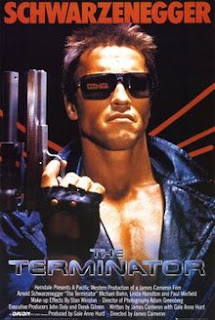That can be difficult. So much has come and gone in the more than 40 years since the movie's initial release, some good, some bad, and some all but impossible to believe.
But try to set all that aside. Just watch the movie and experience it on its own terms. The Terminator a lean, mean thrill machine, packed with nightmarish imagery, an intriguing apocalyptic story, an iconic performance by Arnold Schwarzenegger, and enough humanity to offer hope for the future.
Before the series got overly convoluted, The Terminator's narrative is comparatively straightforward. From a post-apocalyptic future, two figures arrive in our present of 1984. The first is a robotic assassin known as a Terminator (Arnold), a machine that looks and acts human to infiltrate among us and eliminate Sarah Connor (Linda Hamilton).
A young waitress, Sarah is destined to give birth to a son who will grow up and lead the human resistance against the future's machine overlords. If the machines kill her before she then, they will negate the existence of their primary enemy, possibly preventing their overthrow in the future.
Sarah would be completely unprotected except for one man: Kyle Reese (Michael Biehn), a lone warrior the resistance managed to send back. He must find and protect Sarah before the Terminator can locate and kill her.
Let me emphasize something about the original Terminator. It is frightening, genuinely scary. Arnold's brand of cheesy, self-aware humor helped drive his career, but when I watch him here, I don't see Arnold. I see a ruthless, relentless, emotionless killing machine. Even the iconic "I'll be back" moment - the first time he says it - is followed by his driving a truck over a police officer.
Funny? Sure. Shocking and intense? You bet. Like a little chuckle in the face of danger or whistling by a graveyard, it's a small reprieve.
The Terminator is a dark film, thematically and visually. Most of the movie is set at night, and the future is depicted as a post-nuclear wasteland with mountains of wreckage, crumbled buildings, filth, and inhuman, monstrous machines. Who can forget the image of the machines driving over the piles of skulls? The robots resemble metallic skeletons more than C-3PO and are the stuff of nightmares.
The present is not much better: dark, lonely streets; imposing industrial yards; street punks. The club Tech Noir, where the Terminator makes first contact with Sarah, offers ostensible comfort, but the noise, harsh red lighting, and mass of bodies offers relief. Early on, Reese encounters a homeless guy who resembles nothing if not the denizens of the future who are desperate, hungry, cold, miserable, and dirty. The future has already started to impose its nature on the present, even before nuclear war.
The action scenes are as terrifying as they are exciting, particularly the police station shootout. The scene is shot and edited for maximum impact, and when you see the Terminator mow down dozens of police officers, unfazed as bullets bounce off him, you believe he is unstoppable.
Credit must also be given to Brad Fiedel for the great music, especially the main theme - epic and industrial - and to Stan Winston for the special effects that went into creating the Terminator. Yes, there are times when it's obviously a rubber puppet or animation, but on a lower budgeted movie like this, that's forgivable. In the moment, I don't care.
I can't discuss The Terminator without mentioning Arnold. Talk about hitting it out of the park with casting. Arnold's strength as an actor is to take would-be limitations - thick accent, bulky physique, etc. - and turn them into assets. He convinces as an unstoppable cyborg, from his mannerisms to how he carries himself to the cadence of his speech. It is scary, when he pursues his target, and at times, yes, funny, when this machine with no grasp of human emotion or behavior applies ice cold logic.
Take his introduction. He appears naked and accosts a trio of punks (including Bill Paxton and Brian Thompson). The scene starts out kind of goofy as the machine doesn't grasp these guys or appreciate the situation. Then, Arnold rips out someone's heart.
This scene could have been a disaster. It could have soured the villain from the start, made him look ridiculous, but instead, it makes for an unforgettable, frightening entrance.
But The Terminator is not a mindless action fest nor a purely nihilistic vision. Cameron offers hope, a light against the dark: one person can make a difference. Reese - traumatized and battle-scarred- travels time to protect Sarah Connor. He knows it's a one-way trip and that he will be completely outmatched against an inhuman foe, but he does it anyway out of love and to preserve humanity's hope.
Ultimately, Sarah ends up taking her destiny in her own hands. When the Terminator first attacks, she is something of a damsel in distress, bewildered, overwhelmed, and dependent on Reese to protect her. Gradually, her inner strength comes through. She doesn't quite become the action hero figure she becomes in the sequel, but she adapts. She begins to fight for herself, to push through when everyone and everything around her is gone, and in doing so, she becomes "mother of the future."
"There is no fate but what we make." That is the mantra of the series (at least the first couple of entries). When we decide we're not going to passively accept a dark future, we will fight for a hope. Machines might be bigger, stronger, and built to kill us, but they don't know about love or hope. They can't picture a better future, but humans can, and that's our strength.




No comments:
Post a Comment